2024 Hot Water Solar System Price Breakdown: Your Ultimate Guide to Costs & Savings
In your quest to understand hot water solar system price, you’ll find rates ranging from $3,000 to $7,000 for a complete setup. Our article provides a straightforward look at these costs and the financial benefits of solar technology, steering clear of excessive technical jargon.
Key Takeaways
-
Solar hot water systems can provide up to 90% of a household’s hot water needs, leveraging a variety of collector types suitable for different climates and needs, offering significant energy savings.
-
Initial costs, including installation and equipment, for solar hot water systems range from $3,000 to $7,000, but government rebates and long-term savings on energy bills partially offset these expenses.
-
By switching to a solar hot water system, homeowners can significantly reduce carbon emissions, potentially recouping their investment within as little as 1.5 years and benefiting from increased property value and compliance with energy regulations.
Understanding Solar Hot Water Systems
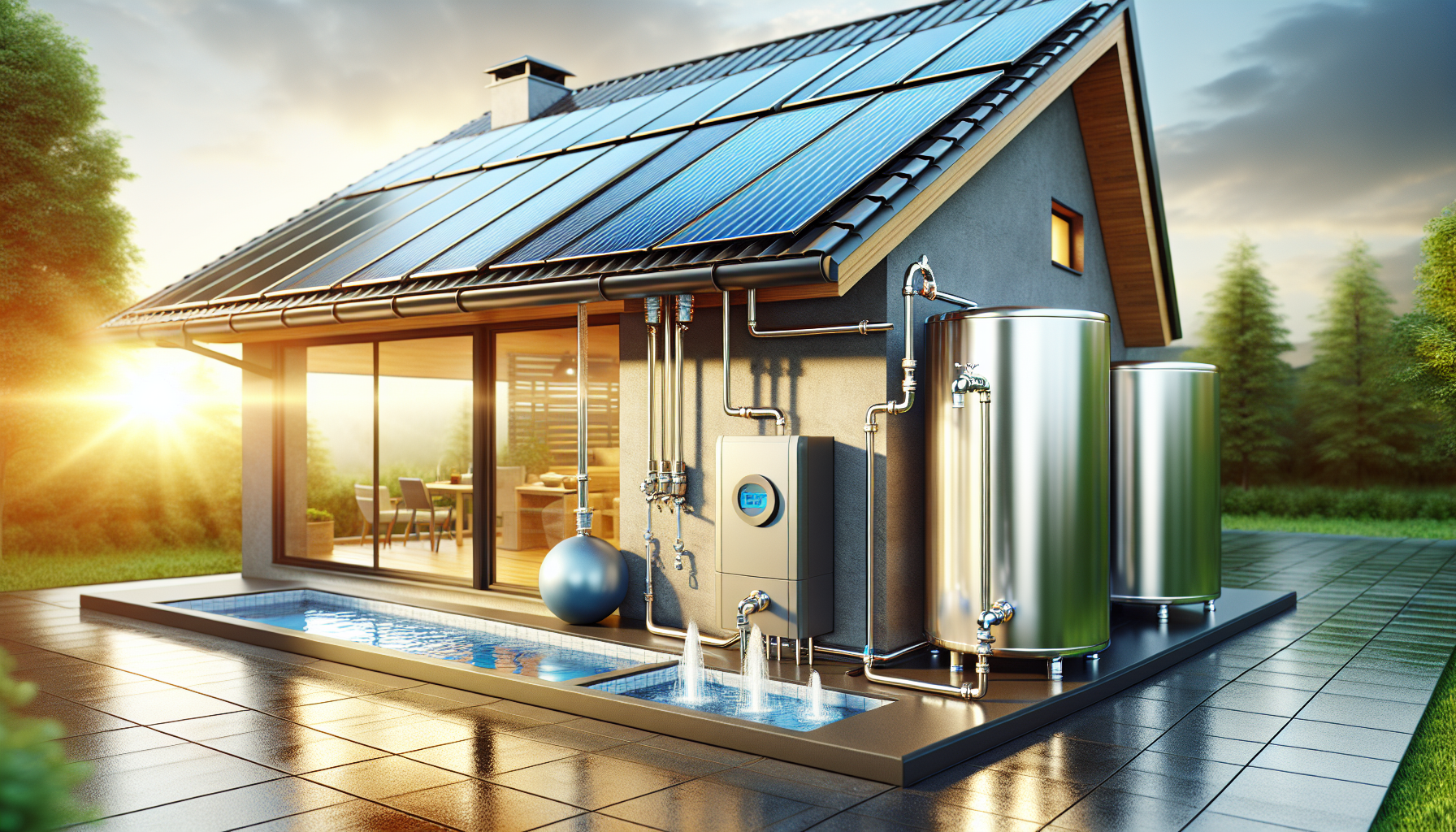
Solar hot water systems efficiently heat your water by harnessing the sun’s energy. These systems comprise core elements such as:
-
a pump
-
solar collectors
-
a storage tank
-
a hot water tap
Imagine, up to 90% of your household’s hot water needs can be fulfilled using the sun’s energy. This is not magic, but the power of solar power technology and nature working hand-in-hand.
Your household’s hot water usage typically dictates the size of a solar hot water system. A rule of thumb is to allocate approximately 50 liters of hot water per person per day. So, whether you are taking a hot shower or washing your dishes, the sun is working for you, saving your money, and contributing to a cleaner environment.
Types of Solar Hot Water Systems
Each type of solar hot water system offers unique benefits. Here are some of the advantages of flat-plate collectors:
-
They are encased within weatherproof boxes, making them durable and long-lasting.
-
They are cost-effective, making them a great option for homeowners on a budget.
-
They work best in warm, sunny climates, where there is ample sunlight to heat the water.
Some effective types of solar collectors are:
-
Flat plate collectors, which are the most common type and consist of a flat, insulated box with a glass or plastic cover and a dark-colored absorber plate
-
Evacuated tube collectors, which consist of transparent glass tubes that maximize solar energy absorption while minimizing heat loss
-
Solar panels, which convert sunlight directly into electricity, making them a popular choice for residential and commercial applications
-
Heat pump systems, which extract heat from the surrounding air to efficiently heat water, making them suitable in areas with less sunlight
These different types of solar collectors offer various advantages and can be chosen based on your specific needs and location.
Your home location, budget, and specific hot water needs will influence the choice of system type.
How Solar Hot Water Systems Work
The working mechanism of these solar hot water systems, including solar hot water heater, is indeed intriguing. Solar collectors, mounted on your roof, capture solar energy from our solar system and transfer the heat to water, which is then stored in the tank for later use. The heated water rises into the storage cylinder, while cooler water descends to be warmed, harnessing the thermosyphon principle.
In colder climates, indirect systems utilize an antifreeze solution like glycol to prevent freezing. This solution passes through a heat exchanger to warm the water in the cylinder. And what about cloudy days, you ask? Well, these systems are equipped with boosters powered by either electricity or a gas hot water system to ensure a consistent hot water supply even when the sun isn’t shining. Thus, you get reliable hot water, come rain or shine, with the help of gas hot water systems.
Solar Hot Water System Prices: Factors & Ranges
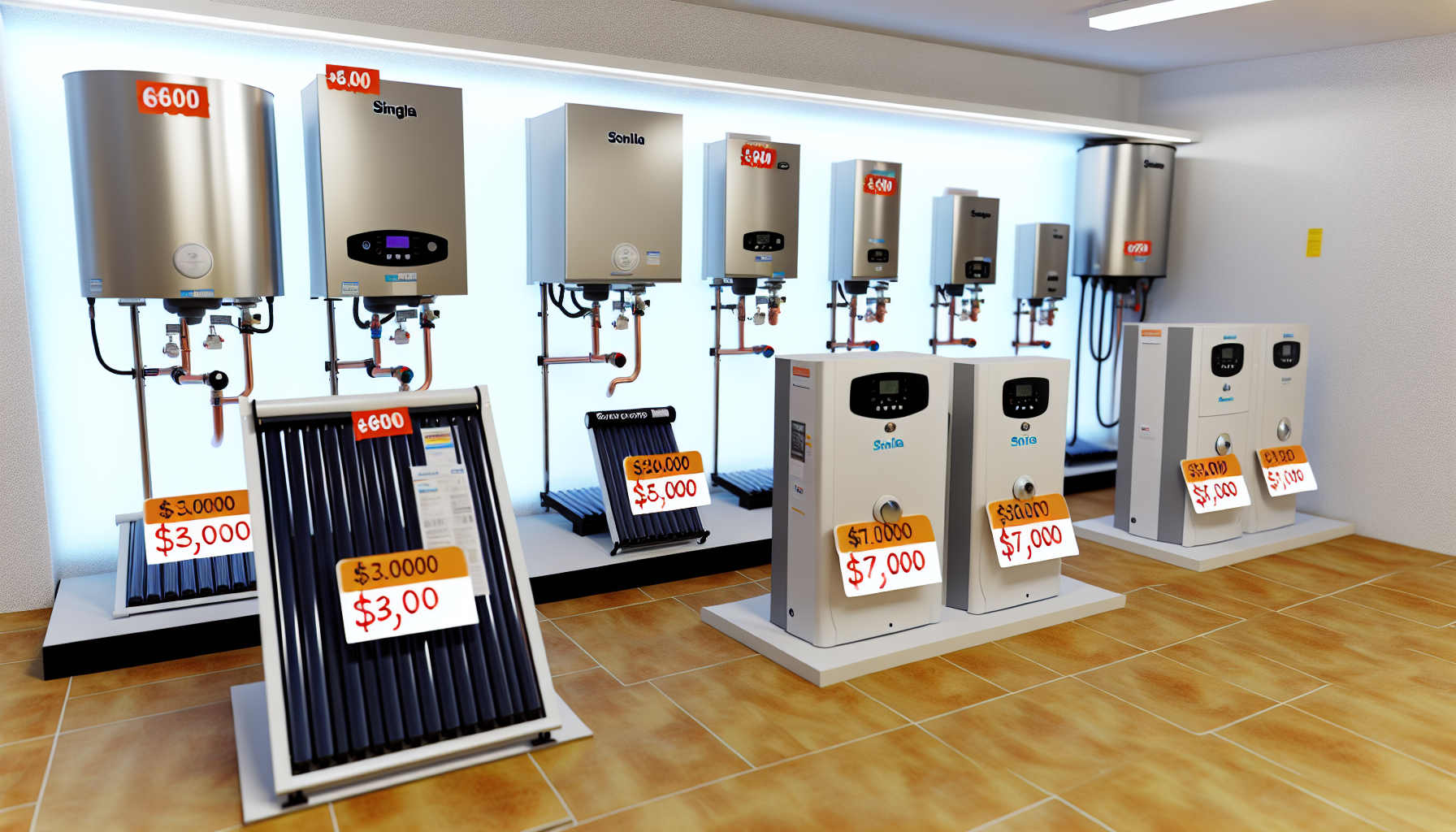
Moving on to the matter of costs. The price of a solar hot water system typically ranges from $3,000 to $7,000 fully installed. This range accounts for various factors such as the size and type of the system, and the complexity of the installation.
A standard solar hot water system in Australia, for instance, ranges between $3,000 and upwards of $6,000 fully installed. However, after Small-scale Technology Certificates (STCs) deductions, the cost for heat pump solar hot water systems usually falls between $3,000 to $4,000. Notably, these prices are subject to local market conditions, and it’s always a good idea to do a thorough comparison before making a purchase.
Installation Costs
A large portion of the initial investment in a solar hot water system goes towards installation costs. These costs typically range from $3,000 to $7,000, with the average being around $5,000. Labor costs, a major component of installation costs, range from $70 to $150 per hour, depending on the installer’s experience and regional labor rates.
However, the total installation cost can vary based on factors like:
-
the size and type of the system
-
the complexity of the installation
-
modifications needed for the installation site, such as roof reinforcement or electrical upgrades
Therefore, it’s essential to consider these potential additional costs when budgeting for your new solar hot water system.
Maintenance Costs
Efficient operation and longevity of your solar hot water system hinge on proper maintenance. Annual professional maintenance checkups for solar water heaters cost between $100 and $250. A full service, scheduled every five years, can cost between $300 and $500.
Apart from these regular checkups and services, you may also need to budget for potential repairs or replacements. For example, common repairs for solar water heaters range from $50 for a leaky relief valve to $850 for improving a system not working at full capacity. Therefore, planning for these potential costs is key to maintaining your system and ensuring it provides reliable service for years to come.
Government Rebates & Incentives
Energy savings is just the beginning of the good news. Government rebates and incentives, such as Small-scale Technology Certificates (STCs), can help offset the costs of solar hot water systems. These STCs can reduce the cost of a solar hot water system by $500 to $1,000 depending on the system size.
Moreover, homeowners in various states have access to specific incentives. For instance, the Energy Savings Scheme in New South Wales provides incentives for homeowners to upgrade to more energy-efficient hot water systems. However, the eligibility for these rebates or concessions can impact the overall price of installing a solar hot water system. Therefore, it’s recommended to review up-to-date information on eligibility and claims processes before making a purchase.
Comparing Solar Hot Water Systems to Traditional Heaters
It’s time to compare solar hot water systems with traditional heaters. Solar hot water systems can significantly reduce annual energy costs compared to traditional gas and electric water heaters. For instance, annual energy usage for solar hot water systems can vary from $55 to $110 annually, much lower than the up to $615 annually that is seen with traditional hot water systems dependent on fuel type.
Apart from the substantial cost savings, the decision to switch to solar can also be influenced by the rising costs of natural gas and electricity, and the opportunity for long-term investment. So, as you can see, opting for a solar hot water system is not only a smart financial move but also a step towards a greener future.
Energy Savings
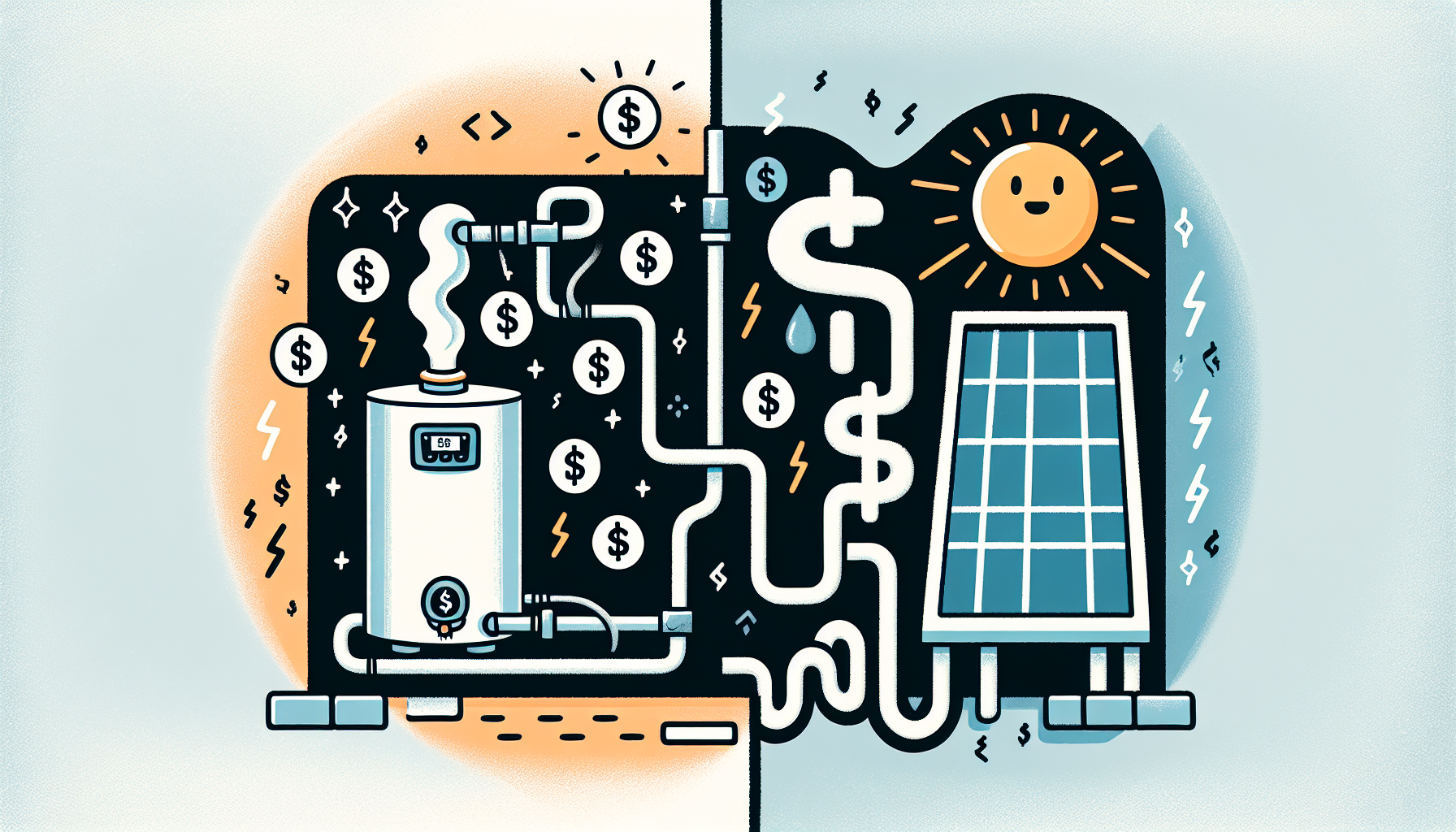
Delving further into the energy savings potential of solar hot water systems reveals more. These systems can reduce annual energy usage costs to between $55 and $110, compared to up to $615 annually for traditional hot water systems. This translates into substantial long-term savings, making the hot water system cost a crucial factor to consider.
For instance, an average family of four can significantly lower their energy costs with a solar hot water system. The specific savings depend on household size - smaller households may pay around $125 annually with solar versus $525 for electric, while larger households could pay $230 for solar versus $970 for electric. This just goes to show that with solar, the savings really do add up!
Environmental Benefits
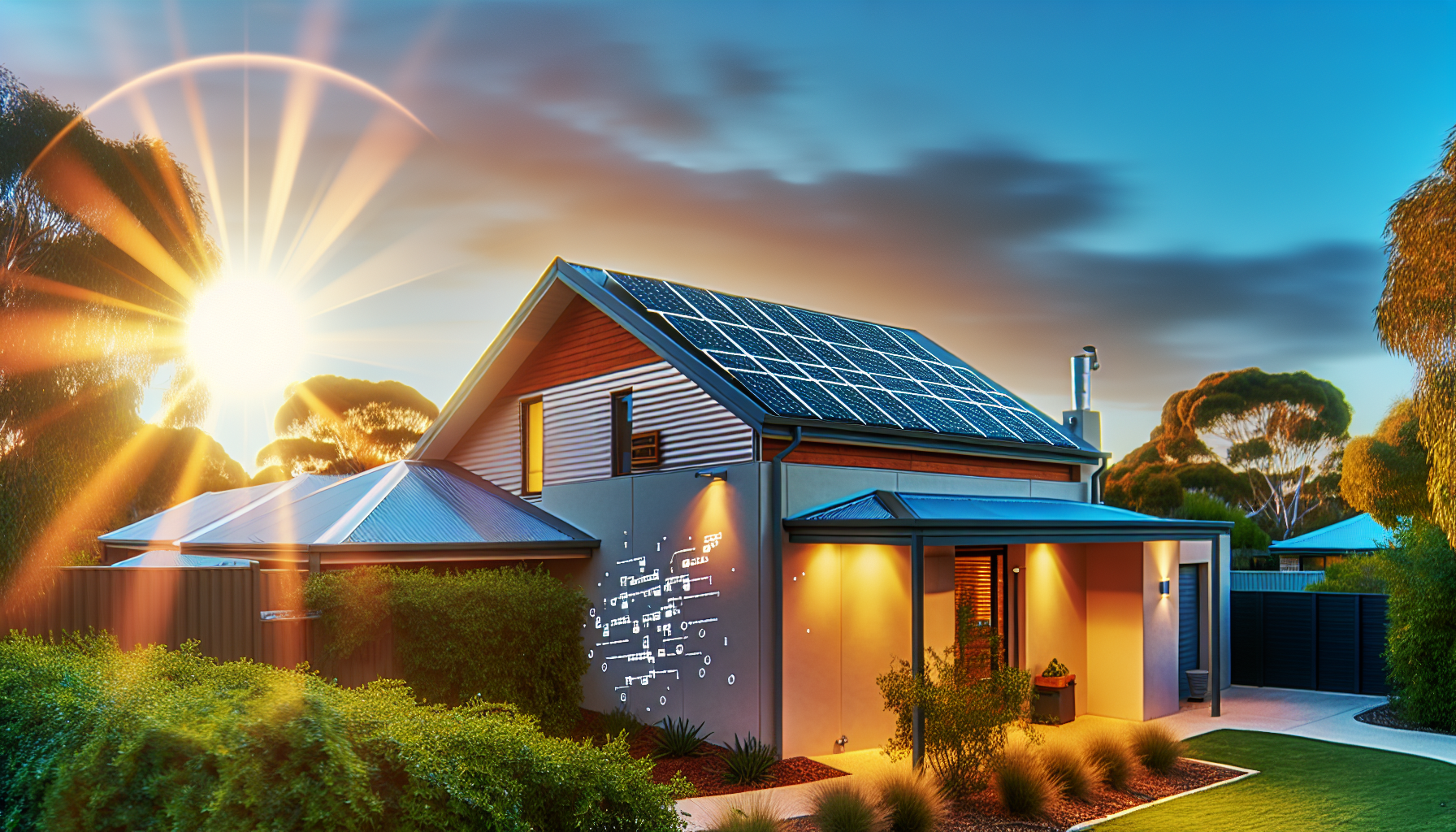
Solar hot water systems not only impact your wallet positively but also benefit the environment by reducing greenhouse gas emissions. These systems can:
-
Save up to 1.6 to 2.7 tonnes of carbon emissions per year
-
Reduce your carbon footprint
-
Provide a significant advantage over traditional heaters that rely on fossil fuels.
Choosing a solar hot water system is a step towards a more sustainable lifestyle. It decreases our reliance on the grid and fossil fuels, leading to fewer toxic emissions. So, by choosing solar, you’re not only saving money but also contributing to a cleaner, greener planet.
Payback Period & Long-term Savings
Undoubtedly, the initial investment is a critical aspect when considering a solar hot water system. But how quickly can you recoup this investment? The payback period can vary considerably, with averages of around 15.3 years compared to natural gas systems, and around 14.5 years for electric systems. However, installing a highly efficient solar hot water system can result in a much shorter payback period, potentially as low as 1.5 years.
But remember, this isn’t just about the payback period. Solar water heater systems can provide reliable service for 20 years or more, making them a durable long-term investment. In addition, investing in a solar hot water system can increase the market value of your home and help in fulfilling government energy-efficiency regulations. So, even as you save on your energy bills, you’re also making a sound investment for the future.
Choosing the Right Solar Hot Water System for Your Home
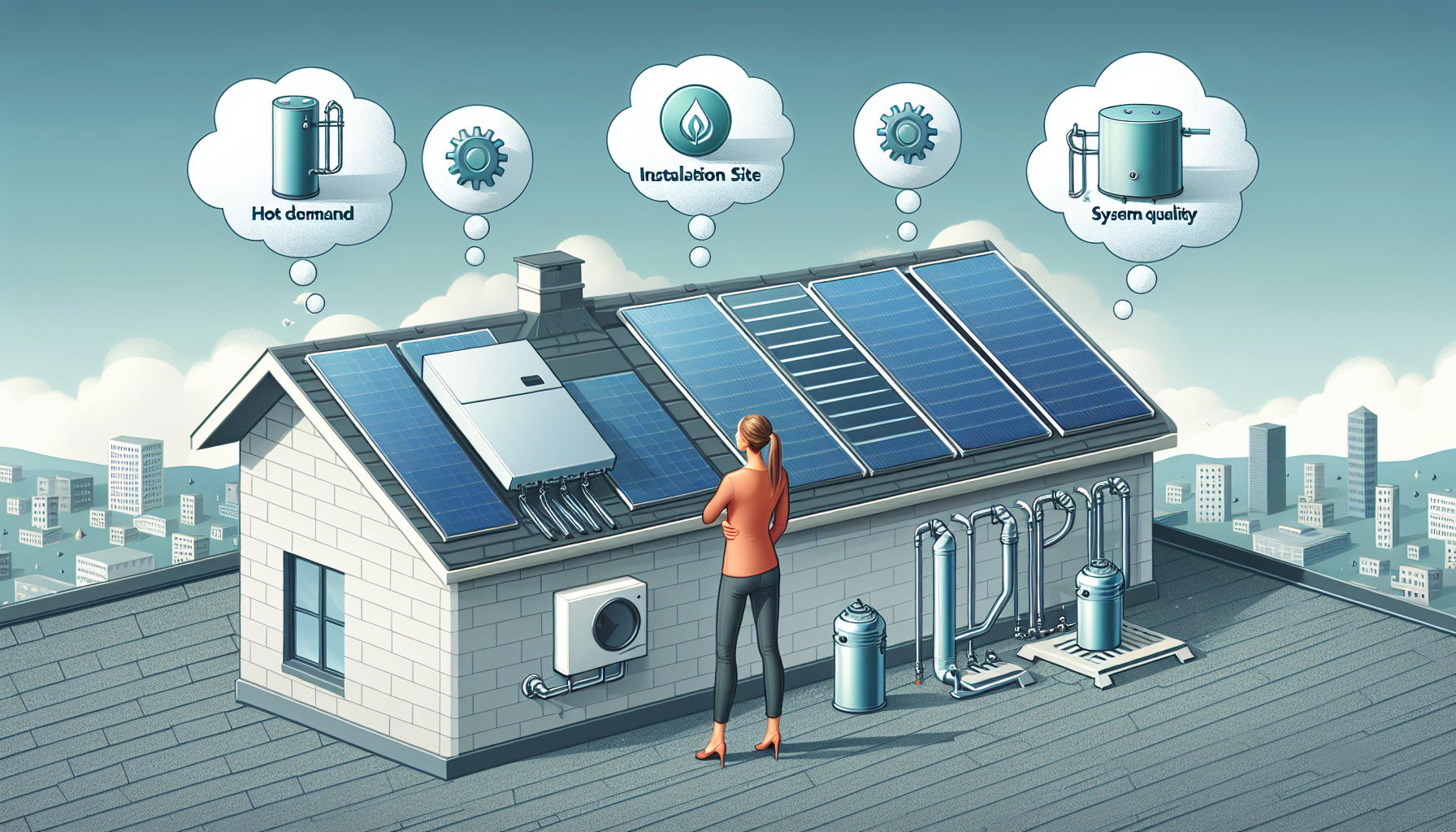
Switching to a solar hot water system is a significant decision, warranting careful selection of the right system for your home. Here are some factors to consider:
-
Consider your total hot water demand by calculating the combined daily usage of all occupants, and take into account peak usage times.
-
Remember to consider the installation site for solar collectors, which ideally should have sufficient unshaded roof space.
-
The collectors should face north for optimal performance.
Quality is another significant factor when choosing a solar hot water system. It’s essential to select trusted professionals and reputable brands that you can rely on. For homeowners concerned with aesthetics, heat pump systems offer options where the heat pumps are integrated into the cylinder, thus requiring less space and appearing more discreet.
Ultimately, the right system for you depends on your specific needs and circumstances.
Tips for Maximizing Efficiency & Savings
Upon installing your solar hot water system, optimizing its efficiency and savings should be the next step. One simple strategy is to use your hot water appliances like dishwashers or washing machines during daylight hours, to maximize solar-heated water. Adjusting the temperature settings or turning off the booster in summer months can also lead to energy savings due to high solar radiation.
Using hot water in the morning allows the system to reheat the water using solar energy throughout the day. Similarly, integrating a timer with solar PV panels can optimize the use of solar energy to power traditional storage tank hot water systems. And don’t forget about maintenance - prompt repairs, such as fixing leaks or addressing lukewarm water, can prevent minor issues from decreasing system efficiency.
Summary
In conclusion, solar hot water systems present a compelling choice for homeowners. They offer significant energy savings, reduce carbon emissions, and can increase the market value of your home. The initial investment in these systems can be offset by government rebates and incentives, and the long-term savings make them a worthwhile investment. With careful selection and regular maintenance, a solar hot water system can provide reliable service for 20 years or more. So, why not make the switch to solar and enjoy the benefits of a greener, more cost-effective solution for your hot water needs?
Frequently Asked Questions
How much does a solar hot water system cost?
A solar hot water system can cost between $3000 to $7000 fully installed, depending on the type of system. It's an investment that can save money in the long run.
Is solar hot water system worth it?
Yes, a solar hot water system is worth it as it will save you thousands in the long run compared to traditional hot water heaters, despite the higher upfront cost. Enjoy long showers and big family get-togethers while saving significantly.
How many solar panels do I need for hot water?
You only need 3 solar panels that produce 15300-watts to run a water heater that uses up to 1500-watts. This will save roof space and be easier to install.
How much can a solar hot water system reduce my energy costs?
A solar hot water system can reduce your energy costs by between $55 and $110 annually, compared to traditional hot water systems which can cost up to $615 per year. Switching to solar can lead to significant savings.
What government rebates and incentives are available for solar hot water systems?
You can save up to $1,000 on a solar hot water system through Small-scale Technology Certificates (STCs), and various states offer additional incentives. Consider exploring these options to reduce your costs.








